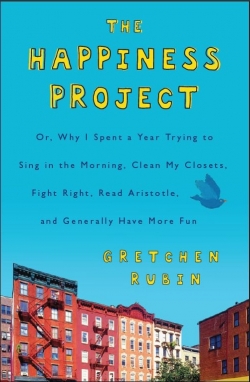
I was just reading Gretchen Rubin’s latest post on her Happiness Project and what she wrote immediately resonated with me. Instead of paraphrasing or just providing a link to her site, I wanted to post a complete portion of her post. She writes about how she was able to write a book in a month because she followed a “boot camp” mentality for getting it done. Anyone who blogs (or writes) will appreciate this stellar advice.
Whenever anyone asks me for advice about how to keep up with writing for a blog, I always say: “Post every day.” Although this sounds arduous, many people find, as I do, that weirdly it’s easier to write every day than just a few times a week.
I think the Boot Camp approach helps the creative process for several reasons, and it helps with all kinds of projects: finishing a photo album, a gardening project, a wood-working project.
- Because you have to get so much done, you don’t have time to listen to your internal critic. You just get something done and keep moving, instead of sitting, paralyzed.
- Progress itself is reassuring and inspiring. Panic tends to set in when you find yourself getting nothing done, day after day.
- Because you’re so focused on your project, you begin to make deeper connections and to see more possibilities, instead of being constantly distracted by outside concerns.
- Because of the intensity, you can hop in and out of the project, without having to take time to acclimate yourself. I have a writer friend who’s married to a painter, and she says their test for working well is when they can sit down and work if they have a spare ten minutes.
- You lower your standards. If you’re producing a page a week, or one blog post a week, or one sketch a week, you expect it to be pretty darned good, and you fret about quality. Often, however, folks achieve their best work from grinding out the product.
- Practice, practice, practice. My novel was terrible, but I think the sheer doing of it helped my writing, just the way practicing scales helps a pianist. The more you practice, the better you’ll become.
- Because you have a voracious need for material, you become hyper-aware of everything happening around you — and ideas begin to flood your mind.
- You can use this approach even if you’re working on a creative project on the side, with all the pressing obligations of a job, family, etc. Instead of feeling perpetually frustrated that you don’t have any time for your project, you make yourself make time — for a specific period.
- It’s fun! I don’t have the urge to climb mountains or run marathons, but I got the same thrill of exertion from writing a novel in a month.
When I’m having trouble getting work done on a big project, my impulse sometimes is to take smaller, easier steps. Sometimes that helps, but sometimes it helps more to take bigger, more ambitious steps instead. By doing more instead of less, I get a boost of energy and focus.

